Suchergebnisse
Forschungsinitiative „Zukunftssicheres Bauen“ – Phase 2 (2015–2018)
Ziel der Forschungsinitiative „Zukunftssicheres Bauen“ ist die Untersuchung ganzheitlicher Aspekte nachhaltigen Bauens als Beitrag zur zukunftsfähigen Weiterentwicklungen von Produkten und Dienstleistungen der Unternehmen der Stein- und keramischen Industrie. Die ÖGUT begleitet die Forschungsinitiative des Fachverbands der Stein- und keramischen Industrie und stellt den Ergebnistransfer zum Forschungsprogramm "Stadt der Zukunft" sicher.
SeasonalGridStorage - Innovative saisonale Wärmespeicher für urbane Wärmenetze

In diesem Projekt wurden Konzepte zur Nutzung innovativer Speichertechnologien, wie thermochemische Speicher (TCS) mit hohen Energiedichten und der Möglichkeit der druck- und verlustlosen Speicherung entwickelt und mit Hilfe von Simulationsrechnungen in technischer, ökologischer und wirtschaftlicher Hinsicht untersucht sowie rechtliche Randbedingungen bewertet.
Schriftenreihe
21/2018
M. Köfinger, D. Basciotti, D. Lager, O. Terreros, C. Zauner, H. Böhm, J. Lindorfer, R. Tichler, A. Zauner
Herausgeber: BMIT
Deutsch, 151 Seiten
Downloads zur Publikation
M-DAB2: Material intensity of inner development - resource assessment and localization of urban development potentials
For the first time, the material intensity of inner development (in terms of material quantities) for different design variants was considered in the evaluation of inner development potentials. A set of methods for the holistic evaluation of potential areas and different development variants and scenarios for resource-saving inner development was created.
Programmevaluierung "Stadt der Zukunft" 2013 - 2021
Im Rahmen dieser Evaluierung wurde überprüft, welche Wirkungen das Programm "Stadt der Zukunft" seit seiner Einführung erzielen konnte. Die Basis dafür bilden umfangreiche Befragungen von Projektnehmer:innen aus der Forschung und Multiplikatoren und Multiplikatorinnen aus Anwendungsgebieten wie der Ziviltechnik und Stadtplanung. Die Evaluierung schafft damit eine wichtige Grundlage für die Gestaltung von zukünftigen Forschungsförderungen.
PVOPTI-Ray: Optimierung reflektierender Materialien und Photovoltaik im Stadtraum bezüglich Strahlungsbilanz und Bioklimatik
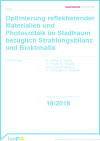
Im Rahmen des Projektes PVOPTI-Ray wurde der Einfluss der Reflexion und der Strahlungsbilanz in städtischem komplexem Gelände auf die Performance von fassadenintegrierter Photovoltaik (PV) untersucht. Ebenso wurde der Einfluss der Solarmodule und der Strahlungswandlung an Solarmodulen auf das Stadtklima analysiert.
Schriftenreihe
18/2018
P. Weihs, S. Zamini, S. Krispel, S. Oswald, M. Peyerl, M. Revesz, A. Schneider, H. Trimmel
Herausgeber: BMVIT
Deutsch, 98 Seiten
Downloads zur Publikation
Lightyard - Vom Innenhof zum Lichthof
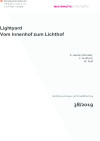
Es wurde untersucht, ob die intelligente Anordnung unterschiedlicher Materialien tageslicht-technisch optimale Lösungen für die Sanierung von Innenhöfen ermöglicht. Das Anheben der Tagesbelichtung in unteren Geschoßen auf mehr als das 10-fache ist damit realistisch. Zusätzlich wurde ein Berechnungstool konzipiert, mit dem optimierte Innenhoflösungen erstellt werden können. Dabei werden lichttechnische, wirtschaftliche und bautechnische Kriterien berücksichtigt.
Schriftenreihe
38/2019
D. Geisler-Moroder, C. Knoflach, W. Pohl
Herausgeber: BMVIT
Deutsch, 40 Seiten
Downloads zur Publikation
Sanierung von Gründerzeitkellern zu Wohnungen mit hoher Lebensqualität und minimalem Energieverbrauch (SPACE4free)
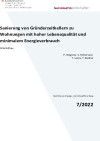
Planung von dauerhaften und schadensfreien Wohnungen mit hoher Lebensqualität und minimalem Energieverbrauch in Souterrainbereichen feuchtebelasteter Keller von Gründerzeithäusern. Durch den Einsatz von innovativen Lüftungssteuerungen wird ein behagliches Raumklima erzeugt. Gleichzeitig wird die Toleranz gegenüber unterschiedlichen Nutzungsarten gewährleistet. Ein Planungstool ermöglicht die Skalierung der Erkenntnisse und somit die Anwendbarkeit auf verschiedenste Planungssituationen.
Schriftenreihe
7/2022
P. Wegerer, S. Hinterseer, T. Lewis, T. Bednar
Herausgeber: BMK
Deutsch, 163 Seiten
Downloads zur Publikation
Piezo-Klett: Entwicklung piezoelektrischer Klettanwendung zur Energieversorgung aktiver Sensorik im Bauwesen
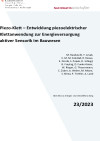
Das vorliegende Projekt betrachtet Gebäude, Gebäudeteile und ihre Anschlüsse (Bauteilknoten) als Energiegeneratoren, indem durch die Anwendung der Klettverbindung in Kombination mit dem piezoelektrischen Effekt ein so genanntes Energy Harvesting betrieben wird.
Schriftenreihe
23/2023
M. Raudaschl, T. Levak, V. M. M. Soledad, R. Riewe, E. Drnda, S. Popek, D. Schlegl, B. Freytag, D. Funke-Kaiser, W. Rieger, G. Theuermann, C. Zuber, A. Weber, M. Moser, S. Klima, P. Treitler, A. Lund
Herausgeber: BMK
Deutsch, 89 Seiten
Downloads zur Publikation
baubehoerde.at - Ausarbeitung einer Vision 2030 und Handlungsempfehlungen für eine digitale Baubehörde mit Stakeholdern in Österreich

Die Einreichung von Baugenehmigungsgesuchen und Abwicklung der Bauverfahren finden in Österreich weitgehend analog statt. Ziele des Projektes baubehoerde.at sind die Evaluierung der Möglichkeiten und Grenzen der Digitalisierung von Abläufen in Bauverfahren und die Erstellung einer Vision 2030 für eine digitale Baubehörde.
Schriftenreihe
44/2020
J. Neuschmid, A. Schindelegger, T. Kleu
Herausgeber: BMK
Deutsch, 136 Seiten
Downloads zur Publikation
PEQBacker: Integrative Quartiersplanung - Enabler auf dem Weg zum Plus-Energie-Quartier
Entwicklung von Leitlinien zur Implementierung von Koordinationsstellen für Plus-Energie-Quartiere auf Basis der Recherche von Erfolgsfaktoren, der Sondierung von fehlenden Elementen bestehender Strukturen und der Konsultation einer breiten Stakeholdergruppe mit dem Ziel, die Transformation von bestehenden und entstehenden Quartieren Richtung Plus-Energie-Quartiere zu erhöhen.
PEQBacker: Integrated District Planning - Enabler on the way to a Plus-Energy District
Development of guidelines for the implementation of Plus-Energy District coordination units based on research of success factors, exploration of mission elements of existing structures and consultation of a broad stakeholder group with the goal of increasing the transformation of existing and emerging neighbourhoods toward Plus-Energy Districts.
Vertical Farming: Ermittlung der Anforderungsbedingungen zur Entwicklung eines Vertical Farm-Prototyps zur Kulturpflanzenproduktion
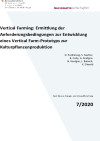
Im Mittelpunkt stand die Erforschung von Grundlagen für eine neue Gebäudetypologie, der Vertikalen Farm. Urbane vertikale Lebensmittelproduktion kann zur Steigerung der Energieeffizienz von und zur Reduktion des Landverbrauchs durch Städte beitragen. Wesentliche Einflussfaktoren zur Erreichung dieser Ziele werden durch diese Grundlagenforschung offen gelegt.
Schriftenreihe
7/2020
D. Podmirseg, S. Sautter, B. Cody, A. Keutgen, N. Keutgen, J. Balasch, K. Diwold
Herausgeber: BMK
Deutsch, 91 Seiten
Downloads zur Publikation
Enerspired Cities - offene harmonisierte Informationsgrundlagen für die energieorientierte Stadtplanung
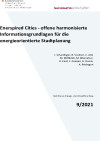
In "Enerspired Cities" wird das Konzept für eine automatisierte Zusammenführung und rechtlich abgesicherte Zugriffssteuerung zu energieräumlich relevanten Datensätzen erarbeitet. Dieses wird in den Städten Innsbruck, Salzburg und Wien an die jeweilig anzutreffende Situation angepasst und in individuellen Pilotanwendungen umgesetzt. Ziel ist die Unterstützung von Stadtplanungs-, Monitoring- und Forschungsvorhaben durch eine einfache und transparente Bereitstellung von Basisdaten aus unterschiedlichsten Quellen für eine breite Schicht von Nutzern.
Schriftenreihe
9/2021
I. Schardinger, B. Vockner, C. Atzl, M. Mittlböck, M. Biberacher, H. Kinzl, L. Gamper, H. Hemis, A. Rehbogen
Herausgeber: BMK
Deutsch, 90 Seiten
Downloads zur Publikation
Erforschung des ersten österreichischen Erneuerbare-Energiegemeinschaften Gewerbe- und Industrieparks (REC-Businesspark)
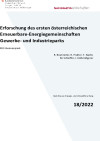
Im Zuge des Projekts erfolgte die Konzeptionierung eines Zero-Emission- bzw. Plus-Energie-Gewerbeparks in Weiz mit Fokus auf Photovoltaik und Brennstoffzelle in Kombination mit einer Erneuerbaren Energiegemeinschaft (E-EGe). Durch die Gründung auf der "grünen Wiese" können sämtliche Strukturen entsprechend den Anforderungen der E-EGe geschaffen werden.
Schriftenreihe
18/2022
R. Bramreiter, R. Pratter, T. Nacht, M. Schloffer, I. Kolb-Stögerer
Herausgeber: BMK
Deutsch, 48 Seiten
Downloads zur Publikation
ParaSol - Multifunktionale solaraktive Platz- und Straßenüberdachung Leoben
Am Use Case Leoben wird erstmals an konkreten Orten ausgelotet, welche stadträumlichen Auswirkungen, Synergie- und Energiepotentiale neu zu entwickelnde, solaraktive Platz- und Straßenüberdachungen in Form von weitgespannten Konstruktionen in Leichtbauweise im öffentlichen urbanen Raum mit sich bringen und wie sie sich auf das Stadtbild und die Stadtfunktion auswirken.
ParaSol - Multifunctional solar canopies for urban streets and places
With the city of Leoben as a use case this exploratory project will, for the first time ever, examine the spatial effects, synergy- and energy potentials of newly developed wide-span light-weight solar canopies for streets and squares in urban public space as well as their implications on the townscape, the image of the city and the city function.
STP2030, St. Pölten 2030: KlimaNEUTRAL + KlimaFIT
Ein breit angelegter partizipatorischer Strategieprozess zur co-kreativen Erarbeitung der "Roadmap zur Klimaneutralität" St. Pöltens bis 2030. Die Roadmap fußt auf einer gemeinsam getragenen Vision, welche differenziert zu Transformationspfaden in unterschiedlichen Handlungsfeldern entwickelt wird. Im Ergebnis soll ein stadtgesellschaftliches "Klima des Wandels" entstehen, das der Basis für die Teilnahme an Ausschreibungen, Kooperation und Umsetzungen auf dem Weg in die Klimaneutralität dient.
STP2030, St. Pölten 2030: KlimaNEUTRAL + KlimaFIT
A broadly based, participatory strategy process for the co-creative development of the “Roadmap to Climate Neutrality” St. Pölten by 2030. The roadmap is based on a shared vision, which is differentiated into transformation paths in different fields of action. The result is a “climate of change” in urban society that serves as the basis for participation in tenders, cooperation and implementation on the way to climate neutrality.
Multi-WP - Hocheffiziente multivalente Wärmepumpenkonzepte zur thermischen Nutzung von Außenluft mit geothermischer Speicherung
Optimierung von Multi-WP-Systemen bestehend aus Luft-Wärmepumpen und Erdspeichern im Hinblick auf Erhöhung der Flexibilität und Effizienz ab 30 kW für Einzelgebäude sowie Quartierslösungen und Behandlung von Aspekten wie PV-Nutzungsoptimierung, Betriebsweise, Nutzungskonflikte und Lärmbelastung durch Luftwärmepumpen. Das Projekt wird die Nutzung der Wärmequelle Außenluft in Kombination mit Saisonspeichern als besonders effiziente Alternative für Heizung, Kühlung und Warmwasserbereitung etablieren.
Multi-WP – High-efficiency multivalent heat pump concepts for the thermal use of external air with geothermal storage
Optimization of multi-WP systems consisting of air-source heat pumps and geothermal storage with regard to increasing flexibility and efficiency from 30 kW for individual buildings as well as neighbourhood solutions and addressing aspects such as PV utilization optimization, mode of operation, utilization conflicts and noise pollution from air-source heat pumps. The project will establish the use of the heat source external air in combination with seasonal storage as a particularly efficient alternative for heating, cooling and hot water supply.
